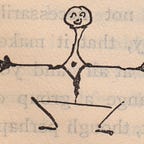Yes, Virginia, There Is Gum in the Future
A Review of Nick Harkaway’s “Titanium Noir”
Set in a not too distant future in which a biotech revolution has meant the rich becoming superhuman, Titanium Noir still manages to keep the gum in “gum shoe.” Nick Harkaway’s protagonist, Cal Sounder, is a private investigator who consults for the police when the latter have cases that deal with the enhanced humans, known appropriately enough as titans. Sounder is, like any tech noir detective, tired and cynical, but he still carries a torch for what feels like we should call “a dame.” And that dame just happens to be a Titan as well.
It all starts, as it must, with a murder, and then things get complicated. I don’t want to spoil the fun, and it is fun, so the plot summary stops here. Needless to say, our good detective finds himself alternately in the halls of power as well as in dens of iniquity. Along the way, there are plenty of moments for our keen-eyed cynic to make observations about the near-future world in which he finds himself.
That world is as dystopian as our own, only more so since the rich not only enjoy better health, but now, thanks to the wonder drug which only they can afford, they are physically bigger, more powerful, and sufficiently long lived as to be close to immortal. It’s a powerful allegorical dimension, and what would have made the novel more compelling, at least for this reader, would be for Harkaway to let the implications of the allegory play out more. That is, we’re told there is poverty in this world in which the rich live, literally, beyond mere mortals, but we don’t ever experience it. We’re told of the machinations of the rich, but we don’t witness it.
With its pacing and limited exploration, the novel feels very cinematic: there is only as much world as needed as set dressing and no more. Make no mistake: it’s quite effective, but the sole focus on only the roller coaster ride of the plot’s twists and turns means that there is no horizon on which you can orient yourself or against which you can enjoy the sensations brought on by such speedy movement.
The ending is much like a thrilling ride: the car screeches to a halt and we pick our heads up breathless. The book is over. Thanks to its speed and efficiency, there’s not much left to savor, which seems a shame, given what all Harkaway has spun up just for the sake of the ride.
That noted, Titanium Noir is fun, though probably not a book I will put on a re-read list. This is one I will pass along to a friend, telling them to pass it along when they are done.
(FTR, if you like tech noir, I can highly recommend A. Lee’s Martinez’s The Automatic Detective. There’s plenty gum left in the future. Give it a chew.)
